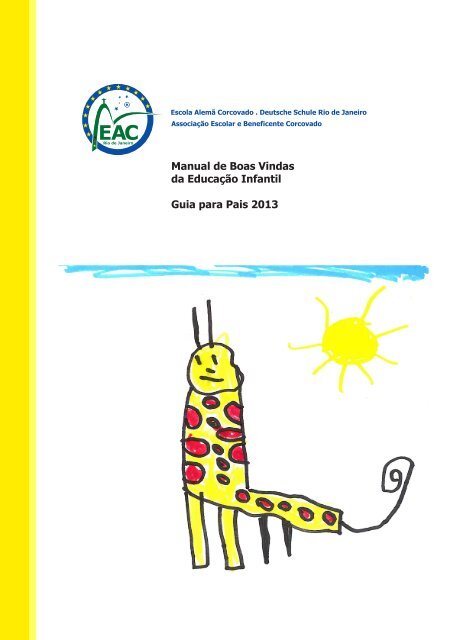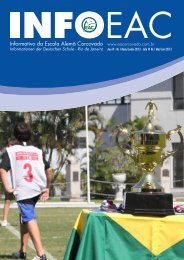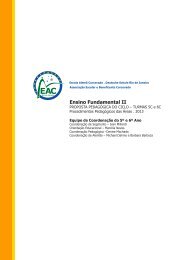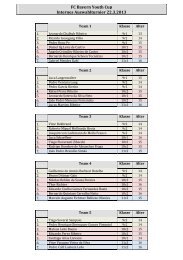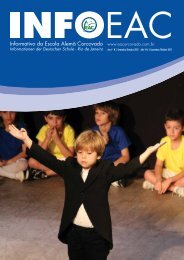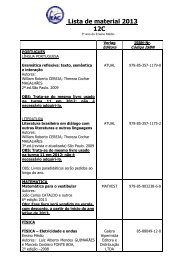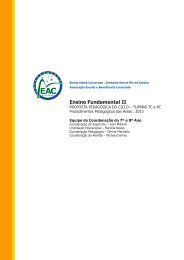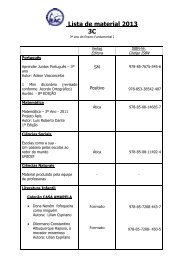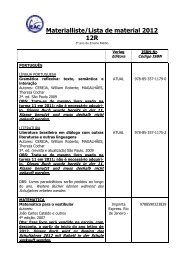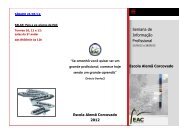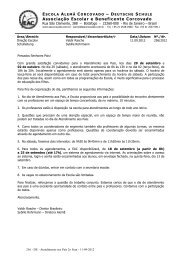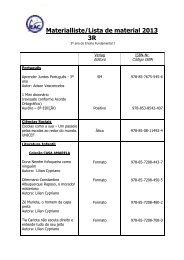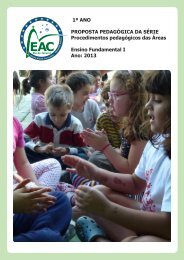Manual de Boas Vindas da Educação Infantil - Escola Alemã ...
Manual de Boas Vindas da Educação Infantil - Escola Alemã ...
Manual de Boas Vindas da Educação Infantil - Escola Alemã ...
Sie wollen auch ein ePaper? Erhöhen Sie die Reichweite Ihrer Titel.
YUMPU macht aus Druck-PDFs automatisch weboptimierte ePaper, die Google liebt.
<strong>Manual</strong> <strong>de</strong> <strong>Boas</strong> <strong>Vin<strong>da</strong>s</strong><strong>da</strong> Educação <strong>Infantil</strong>Guia para Pais 2013
3.3. O Desenvolvimento <strong>da</strong> AutonomiaUma <strong>da</strong>s mais importantes diretrizes do trabalho <strong>de</strong>senvolvido na Educação <strong>Infantil</strong>é o <strong>de</strong>senvolvimento <strong>da</strong> autonomia <strong>da</strong> criança. Levando em consi<strong>de</strong>ração o estágio<strong>de</strong> seu <strong>de</strong>senvolvimento bio-psico-social, vamos ensinando às crianças a assumiremnovas responsabili<strong>da</strong><strong>de</strong>s e a li<strong>da</strong>rem com situações que favoreçam o seu crescimento.Aguar<strong>da</strong>r na garagem ou na pracinha o momento <strong>da</strong> subi<strong>da</strong> para a Educação <strong>Infantil</strong>,pendurar a própria mochila no gancho i<strong>de</strong>ntificado pelo seu nome, cui<strong>da</strong>r dos seusobjetos pessoais, entregar bilhetes <strong>da</strong> família para a professora, relacionar-se comas crianças e os adultos, cui<strong>da</strong>r <strong>da</strong> higiene pessoal, pedir aju<strong>da</strong> para tarefas maiscomplexas, escolher um livro na Biblioteca – são estas as situações cotidianas com asquais as crianças são confronta<strong>da</strong>s e em relação às quais os professores, no espaçoescolar, e a família, em casa, têm que atuar como mediadores, e não como aquelesque fazem pela criança.O <strong>de</strong>senvolvimento <strong>da</strong> autonomia é, por excelência, um trabalho sistemático <strong>de</strong>parceria entre a família e a <strong>Escola</strong>. No início, esta po<strong>de</strong> ser uma tarefa <strong>de</strong>safiadora,especialmente para as famílias, mas trata-se <strong>de</strong> um trabalho conjunto que ren<strong>de</strong>frutos maravilhosos em forma <strong>de</strong> sorrisos, auto-estima e bem-estar!4. A Chega<strong>da</strong> à Educação <strong>Infantil</strong>4.1. A A<strong>da</strong>ptaçãoA chega<strong>da</strong> a uma nova escola é vivencia<strong>da</strong> <strong>de</strong> diversas maneiras por alunos e famílias.Assim, a a<strong>da</strong>ptação é também um processo único e individual, pois <strong>de</strong>pen<strong>de</strong> emgran<strong>de</strong> parte <strong>da</strong> forma como se li<strong>da</strong> com a novi<strong>da</strong><strong>de</strong> e o diferente, a separação <strong>de</strong> paise filhos e as experiências escolares anteriores.Às crianças do Maternal II e <strong>da</strong> Pré-<strong>Escola</strong> I oferecemos dois dias <strong>de</strong> a<strong>da</strong>ptaçãodurante os quais um dos pais po<strong>de</strong> acompanhar seu filho ou sua filha. No 1º dia, oresponsável po<strong>de</strong> permanecer no próprio espaço <strong>da</strong> Educação <strong>Infantil</strong>, acompanhando<strong>de</strong> perto a criança. No 2º dia, pedimos que o responsável permaneça na <strong>Escola</strong>,preferencialmente na Biblioteca dos Alunos ou na Cantina. Se após estes dois diasain<strong>da</strong> houver necessi<strong>da</strong><strong>de</strong> <strong>da</strong> presença do responsável, uma a<strong>da</strong>ptação diferencia<strong>da</strong>será organiza<strong>da</strong> individualmente com a Professora <strong>de</strong> Classe e a família.Aos pais <strong>da</strong>s crianças <strong>da</strong> Pré-<strong>Escola</strong> II pedimos que um dos responsáveis permaneçana <strong>Escola</strong> no 1º dia, preferencialmente na Biblioteca dos Alunos ou na Cantina.A presença dos pais geralmente não se faz necessária no 2º dia. Entretanto, caso sejanecessária, será organiza<strong>da</strong> uma a<strong>da</strong>ptação diferencia<strong>da</strong> com a Professora <strong>de</strong> Classee a família.5
4.2.3. O tempo <strong>de</strong> espera dos pais nos dias <strong>de</strong> a<strong>da</strong>ptaçãoOs primeiros dias <strong>da</strong> criança na Educação <strong>Infantil</strong> são essenciais para a formação dovínculo <strong>de</strong> ca<strong>da</strong> criança com a sua Professora <strong>de</strong> Classe. Por isso, pedimos que sejamobserva<strong>da</strong>s as seguintes recomen<strong>da</strong>ções:• Caso a criança precise ir ao banheiro ou queira beber água, pedimos que os paisindiquem uma <strong>da</strong>s professoras para ajudá-la e atendê-la. Da mesma forma, pedimosque não tragam lanches ou bebi<strong>da</strong> <strong>da</strong> Cantina para a criança.• Evitem colocar a criança no colo ou começar brinca<strong>de</strong>iras. Estimulem-na a brincarno pátio e a procurar a companhia <strong>de</strong> outras crianças.4.2.4. A<strong>da</strong>ptação ao espaço físico e pequenos aci<strong>de</strong>ntesDurante o período <strong>de</strong> a<strong>da</strong>ptação, a criança também está conhecendo o espaçofísico <strong>da</strong> escola. Po<strong>de</strong>m ocorrer, principalmente no pátio, que<strong>da</strong>s e encontrões e,consequentemente, pequenos machucados. As professoras tomarão as providênciasnecessárias para aten<strong>de</strong>r as crianças nestas situações.5. As rotinas na Educação <strong>Infantil</strong>5.1. Horários <strong>de</strong> entra<strong>da</strong> e saí<strong>da</strong>Manhã:Entra<strong>da</strong>: 7h15minSaí<strong>da</strong>: 11h35minTar<strong>de</strong>:Entra<strong>da</strong>: 12h45minSaí<strong>da</strong>: 17h00min• Pedimos pontuali<strong>da</strong><strong>de</strong> nos horários <strong>de</strong> entra<strong>da</strong> e saí<strong>da</strong>.• As crianças que são trazi<strong>da</strong>s para a escola <strong>de</strong> carro, <strong>de</strong>vem <strong>de</strong>spedir-se dos seus paisna garagem. Já as crianças que vêm a pé, <strong>de</strong>vem <strong>de</strong>spedir-se dos seus responsáveisna pracinha.• A partir <strong>da</strong>s 7h00min e <strong>da</strong>s 12h30min, as Professoras <strong>de</strong> Classe e os ProfessoresAuxiliares estarão na garagem ou na pracinha à espera dos alunos.• No segundo semestre, os alunos <strong>da</strong> Pré-<strong>Escola</strong> II já se encaminham sozinhos paraa Educação <strong>Infantil</strong>.• Pedimos que na hora <strong>da</strong> saí<strong>da</strong> os pais que vêm a pé esperem as crianças napracinha em frente à portaria.7
5.2. Plano Semanal <strong>de</strong> Ativi<strong>da</strong><strong>de</strong>sO Currículo por Competências norteia os planos semanais <strong>de</strong> trabalho <strong>da</strong> Educação<strong>Infantil</strong>. Os projetos <strong>de</strong>senvolvidos incluem tanto os dias <strong>de</strong> imersão na língua alemãcomo as aulas <strong>da</strong>s disciplinas específicas. Artes, Música, Educação Ambiental eAtivi<strong>da</strong><strong>de</strong>s no Ginásio e na Quadra bem como as i<strong>da</strong>s à Biblioteca <strong>Infantil</strong> são integra<strong>da</strong>saos projetos em an<strong>da</strong>mento conforme a tabela abaixo:Ativi<strong>da</strong><strong>de</strong> Frequência Coor<strong>de</strong>naçãoArtes 2 vezes por semana Professora <strong>de</strong> ArtesMúsica 2 vezes por semana Professora <strong>de</strong> MúsicaEducação Ambiental 2 vezes por mês Professor <strong>de</strong> Educ. AmbientalGinásio/Quadra 1 vez por semana Professora <strong>de</strong> ClasseBiblioteca 1 vez por semana Bibliotecária5.3. A hora do lancheA hora do lanche é um momento <strong>de</strong> alegria e <strong>de</strong> confraternização com os amigos.Além disso, é um momento oportuno para que a criança adquira hábitos alimentaressaudáveis. Desta forma, sugerimos que os responsáveis cui<strong>de</strong>m <strong>da</strong> composição <strong>de</strong>um cardápio variado e nutritivo: uma porção <strong>de</strong> frutas, sanduíches <strong>de</strong> pão integralcom queijo ou geléia, barras <strong>de</strong> cereais, iogurtes, ovos cozidos ou verduras cruas,bolos e biscoitos caseiros. No lanche, a <strong>Escola</strong> oferece às crianças mate, limona<strong>da</strong>,achocolatados e sucos feitos na hora. A qualquer momento, a criança po<strong>de</strong> se servir<strong>de</strong> água filtra<strong>da</strong>.Algumas sugestões para o lanche:• Frutas: maçã, pêra, morango, uva, manga, banana, pêssego, ameixa, abacaxi, etc.• Sala<strong>da</strong> <strong>de</strong> frutas• Uva passa, banana passa, barras <strong>de</strong> cereais• Sanduíches <strong>de</strong> pão integral com queijo ou geléia• Iogurtes• Ovo cozido (codorna, galinha), cenoura crua, tomate, etc.• Biscoitos e bolos feitos em casa8
Alguns lembretes importantes:• Temos uma gela<strong>de</strong>ira para guar<strong>da</strong>r lanches perecíveis. A criança é responsáveltambém por colocar o lanche na cestinha que vai para a gela<strong>de</strong>ira. Assim sendo, ela<strong>de</strong>ve ser diariamente informa<strong>da</strong> a respeito do seu lanche pela família.• Favor não man<strong>da</strong>r: chicletes, balas, chocolates, biscoitos recheados, batatinhafrita e outros salgadinhos, refrigerantes e bebi<strong>da</strong>s em geral (ex: suco ou Nescau <strong>de</strong>caixinha, etc).• As crianças <strong>da</strong> Educação <strong>Infantil</strong> não têm permissão para usar o serviço <strong>da</strong> cantina.5.4. FiltrosÉ importante que a criança traga todo dia um copo <strong>de</strong> plástico para po<strong>de</strong>r tomar águados filtros disponíveis no pátio. O copo <strong>de</strong>ve ter a i<strong>de</strong>ntificação nominal e ficará sob aresponsabili<strong>da</strong><strong>de</strong> <strong>da</strong> própria criança, que <strong>de</strong>ve guardá-lo ao final do dia para levá-lo <strong>de</strong>volta para casa. A Professora <strong>de</strong> Classe supervisionará esta rotina.5.5. Supervisão do banheiroTo<strong>da</strong>s as crianças são estimula<strong>da</strong>s a cui<strong>da</strong>rem <strong>da</strong> própria higiene: usar o vasoa<strong>de</strong>qua<strong>da</strong>mente, jogar o papel higiênico na lixeira e <strong>da</strong>r a <strong>de</strong>scarga, lavar as mãose jogar o papel toalha na lixeira, são hábitos que são acompanhados atentamentepelas professoras, especialmente no início do ano letivo. Aos poucos, espera-se quea criança <strong>de</strong>senvolva total autonomia em relação ao uso do banheiro, <strong>de</strong> modo queas professoras possam restringir-se à supervisão <strong>de</strong>ssa ativi<strong>da</strong><strong>de</strong>. Neste sentido, esteestímulo <strong>de</strong>ve necessariamente vir também <strong>de</strong> casa.Observação: Caso necessário, as crianças <strong>de</strong> 3 anos são acompanha<strong>da</strong>s e recebemaju<strong>da</strong> <strong>da</strong> professora na hora <strong>de</strong> ir ao banheiro.5.6. Turno AmpliadoÀs crianças <strong>da</strong> Pré-<strong>Escola</strong> II do turno <strong>da</strong> manhã é ofereci<strong>da</strong> a possibili<strong>da</strong><strong>de</strong> <strong>de</strong>participarem do turno ampliado. No turno ampliado as crianças têm a oportuni<strong>da</strong><strong>de</strong><strong>de</strong> um contato mais prolongado com a língua alemã em situações lúdicas e alegres.Nestas tar<strong>de</strong>s, a psicomotrici<strong>da</strong><strong>de</strong>, a culinária e as brinca<strong>de</strong>iras têm seu espaço, assimcomo a criativi<strong>da</strong><strong>de</strong> e a motivação para a contemplação <strong>de</strong> pequenos fenômenos <strong>da</strong>natureza. A autonomia, a responsabili<strong>da</strong><strong>de</strong> e o respeito são incentivados continuamente.Para maiores informações a respeito do turno ampliado, favor consultar a Secretaria<strong>da</strong> <strong>Escola</strong> no início do ano letivo.9
5.7. O Dia do BrinquedoTo<strong>da</strong> última sexta-feira do mês é dia do brinquedo. As crianças po<strong>de</strong>m trazer o seubrinquedo preferido para a escola. Lembramos que os brinquedos serão compartilhadose manuseados pelas outras crianças. Por isso, sugerimos que as crianças não tragambrinquedos cujas peças sejam muito pequenas, brinquedos frágeis ou brinquedos <strong>de</strong>um tamanho inapropriado para a criança carregar. Armas e espa<strong>da</strong>s, vi<strong>de</strong>o gamesportáteis, celulares e outros jogos eletrônicos não são permitidos.5.8. AniversáriosOs aniversários po<strong>de</strong>rão ser comemorados na <strong>Escola</strong>, <strong>de</strong>s<strong>de</strong> que sejam observa<strong>da</strong>s asseguintes regras:• A Professora <strong>de</strong> Classe <strong>de</strong>verá ser avisa<strong>da</strong> com, no mínimo, 3 dias <strong>de</strong> antecedênciaatravés <strong>de</strong> comunicado por escrito enviado pela criança. A família <strong>de</strong>verá aguar<strong>da</strong>r aconfirmação <strong>da</strong> Professora.• A comemoração será na sala <strong>de</strong> aula, na presença <strong>de</strong> todo o grupo, e a família seresponsabilizará por enviar o bolo <strong>de</strong> aniversário.• Os pais não participam <strong>da</strong> comemoração do aniversário do filho ou <strong>da</strong> filha na<strong>Escola</strong>.• Não <strong>de</strong>verão ser enviados convites nem lembrancinhas para a comemoração na<strong>Escola</strong>.• Convites para festas fora <strong>da</strong> <strong>Escola</strong> somente serão distribuídos pela Professora <strong>de</strong>Classe se forem para todos os alunos do grupo.5.9. Saí<strong>da</strong>s Pe<strong>da</strong>gógicasOs passeios e as visitas são organizados <strong>de</strong> acordo com os projetos que estão sendo<strong>de</strong>senvolvidos no grupo. São partes integrantes do trabalho <strong>de</strong>senvolvido na Educação<strong>Infantil</strong>, sendo, pois, importante a participação <strong>de</strong> to<strong>da</strong>s as crianças. Estas ativi<strong>da</strong><strong>de</strong>sestão previstas na mensali<strong>da</strong><strong>de</strong> escolar.10
6. Comunicação <strong>Escola</strong>-Família-<strong>Escola</strong>6.1 A comunicação entre a <strong>Escola</strong> e as famílias se dá porduas vias: através <strong>da</strong> pasta <strong>da</strong> criança e <strong>de</strong> mensagenseletrônicas (e-mail): comunicacao@eacorcovado.com.br6.1.1 Pasta <strong>da</strong> Criança:• A pasta será forneci<strong>da</strong> pela <strong>Escola</strong> e servirá como meio <strong>de</strong> comunicação direta coma Professora <strong>de</strong> Classe através dos bilhetes.• Os bilhetes são a forma <strong>de</strong> comunicação família-professora. No início do ano, paracriar o hábito, as professoras perguntam na chega<strong>da</strong> à <strong>Escola</strong> se alguém trouxe umbilhete <strong>de</strong> casa. Espera-se que, aos poucos, a criança adquira esta autonomia e passea lembrar sozinha dos recados. É importante também o estímulo <strong>de</strong> casa para que acriança lembre <strong>de</strong> entregar os bilhetes e avisar quando há algum recado <strong>da</strong> <strong>Escola</strong>.• A pasta irá diariamente para casa e <strong>de</strong>verá voltar no dia seguinte para a <strong>Escola</strong>.• A pasta serve também para circulares, boletins informativos, tarefas <strong>de</strong> casa etransporte <strong>de</strong> livros <strong>da</strong> Biblioteca.• Caso a criança perca a pasta, pedimos que a família provi<strong>de</strong>ncie uma outra pasta<strong>da</strong> mesma cor.6.1.2 Mensagens Eletrônicas• As comunicações institucionais são feitas através do e-mail dos responsáveis.Assim, é <strong>de</strong> extrema importância manter os <strong>da</strong>dos dos e-mails atualizados junto àsecretaria <strong>da</strong> <strong>Escola</strong> e verificar sempre se há e-mails <strong>da</strong> <strong>Escola</strong>.• Caso ocorra algum problema no recebimento dos e-mails <strong>da</strong> <strong>Escola</strong>, por favor, entreem contato com o <strong>de</strong>partamento <strong>de</strong> comunicação: comunicacao@eacorcovado.com.br6.2 Autorizações para saí<strong>da</strong>s com terceiros, saí<strong>da</strong>s antecipa<strong>da</strong>se mu<strong>da</strong>nça na forma habitual <strong>de</strong> saí<strong>da</strong> e faltas:• Caso ocorra uma mu<strong>da</strong>nça na forma habitual <strong>de</strong> saí<strong>da</strong> <strong>da</strong> criança <strong>da</strong> <strong>Escola</strong>,pedimos que os pais comuniquem por bilhete escrito e <strong>da</strong>tado à Professora <strong>de</strong> Classe.Caso a criança volte <strong>de</strong> van ou ônibus para casa, é importante avisar os responsáveispelo transporte escolar.• Por medi<strong>da</strong> <strong>de</strong> segurança, não será autoriza<strong>da</strong> a saí<strong>da</strong> <strong>da</strong> criança, somente através<strong>de</strong> telefonema ou e-mail.• Em caso <strong>de</strong> emergência a comunicação <strong>de</strong>ve ser feita através do e-mail <strong>da</strong> Educação<strong>Infantil</strong>: kiga@eacorcovado.com.br até as 11h00 no turno <strong>da</strong> manhã e até as 16h30minno turno <strong>da</strong> tar<strong>de</strong>.• Em caso <strong>de</strong> saí<strong>da</strong> antecipa<strong>da</strong> é necessário preencher o Formulário <strong>de</strong> Autorização<strong>de</strong> Saí<strong>da</strong>, na secretaria <strong>da</strong> <strong>Escola</strong>.11
• To<strong>da</strong> falta (doença ou viagem) <strong>de</strong>ve ser comunica<strong>da</strong> por bilhete ou e-mail:kiga@eacorcovado.com.br Lembramos que assidui<strong>da</strong><strong>de</strong> e pontuali<strong>da</strong><strong>de</strong> são importantespara a educação e o bom <strong>de</strong>senvolvimento <strong>da</strong> criança.• A <strong>Escola</strong> <strong>de</strong>verá ser avisa<strong>da</strong> por escrito em casos <strong>de</strong> um período <strong>de</strong> afastamentodos pais por motivos profissionais e/ou particulares. Pedimos, também, que nestescasos seja indicado o responsável sob cujos cui<strong>da</strong>dos a criança ficará e/ou os meiospara contato com os pais.7. Roupas e Mochilas• Mochilas, casacos, roupas e recipientes <strong>de</strong> meren<strong>da</strong> <strong>de</strong>vem ser i<strong>de</strong>ntificados como nome <strong>da</strong> criança. A <strong>Escola</strong> não se responsabiliza por pertences sem nome.• Pedimos enviar diariamente uma mu<strong>da</strong> <strong>de</strong> roupa completa na mochila.• É importante manter uma capa <strong>de</strong> chuva na mochila. Por favor, evitar que ascrianças tragam guar<strong>da</strong>-chuvas.• No verão, nos dias quentes, enviar um calção ou um biquíni e uma pequena toalha<strong>de</strong> banho para os banhos <strong>de</strong> mangueira.• É importante que a criança venha com roupas confortáveis, que ela possa sujar.• Pedimos que a criança não venha com jóias (relógio, anel, colar)ou portando dinheiro.• A mochila <strong>de</strong>verá ser <strong>de</strong> tamanho a<strong>de</strong>quado à criança, gran<strong>de</strong> o suficiente paraacomo<strong>da</strong>r uma pasta A4, e sem rodinhas.8. I<strong>de</strong>ntificações e Ca<strong>da</strong>stros• Os pais que irão <strong>de</strong>ixar e pegar os filhos na garagem <strong>de</strong>vem solicitar um a<strong>de</strong>sivo <strong>de</strong>i<strong>de</strong>ntificação na Secretaria para que possam entrar na garagem <strong>da</strong> <strong>Escola</strong>.• A fim <strong>de</strong> que possamos manter nossos ca<strong>da</strong>stros atualizados e evitarmos problemas<strong>de</strong> comunicação, pedimos que comuniquem sempre à Secretaria <strong>Escola</strong>r a mu<strong>da</strong>nça<strong>de</strong> en<strong>de</strong>reço, telefone e/ou e-mail.12
9. Enfermaria• Caso a criança necessite tomar algum remédio, o responsável, munido <strong>da</strong> receitamédica, <strong>de</strong>verá entregar o remédio a ser ministrado na Enfermaria <strong>da</strong> <strong>Escola</strong>. Éterminantemente vetado aos pais man<strong>da</strong>rem remédios através <strong>de</strong> seus filhos.• Crianças com piolhos, impetigo ou outras doenças contagiosas <strong>de</strong>vem permanecer emcasa. Favor avisar a <strong>Escola</strong> imediatamente através do e-mail: kiga@eacorcovado.com.br• Caso ocorra algum aci<strong>de</strong>nte, a criança será encaminha<strong>da</strong> à enfermaria, sempreacompanha<strong>da</strong> <strong>de</strong> um responsável.10. BibliotecaAs crianças <strong>da</strong> Educação <strong>Infantil</strong> têm um horário fixo na biblioteca para po<strong>de</strong>remestabelecer <strong>de</strong>s<strong>de</strong> pequenas um vínculo afetivo com o livro.As bibliotecárias contam uma história e <strong>de</strong>pois elas têm um tempo para escolher olivro que levarão para a casa. Para tanto, precisam estar com suas pastas, nas quaisos livros serão transportados. É imprescindível que os alunos <strong>de</strong>volvam os livros nasemana seguinte para po<strong>de</strong>rem levar um novo livro.Os responsáveis também po<strong>de</strong>m usufruir <strong>da</strong>s bibliotecas. Os materiais emprestadosserão colocados no nome do(a) filho(a).Nossa <strong>Escola</strong> dispõe <strong>de</strong> duas bibliotecas:• Biblioteca principal (Turmas 5 – 12)• Biblioteca <strong>Infantil</strong> (Educação <strong>Infantil</strong> até Turma 4).Ambas estão abertas <strong>de</strong> segun<strong>da</strong> a sexta-feira <strong>da</strong>s 07h05min às 16h30min.Saiba quem procurar na biblioteca:• Ana Carolina Lima: Bibliotecária• Ilka Moraes : Assistente bilíngue• Maria Dubois: Auxiliar13
11. Reuniões com os paisNo <strong>de</strong>correr do ano letivo a Educação <strong>Infantil</strong> organiza três reuniões com os pais.11.1 Reunião InformativaEsta reunião ocorre em fevereiro e é <strong>de</strong>stina<strong>da</strong> principalmente aos novos pais <strong>da</strong> EAC.A Direção <strong>Escola</strong>r e a equipe <strong>da</strong> Educação <strong>Infantil</strong> apresentam-se, a rotina <strong>da</strong> criançaé <strong>de</strong>talha<strong>da</strong> e explica-se o processo <strong>de</strong> a<strong>da</strong>ptação <strong>da</strong> criança ao novo espaço escolar.Nesta oportuni<strong>da</strong><strong>de</strong>, os pais mantêm o primeiro contato com as professoras dos seusfilhos.11.2 Reuniões Pe<strong>da</strong>gógicasA primeira reunião pe<strong>da</strong>gógica do ano ocorre em março e tem o objetivo <strong>de</strong> apresentaro Currículo por Competências <strong>da</strong> Educação <strong>Infantil</strong> aos pais. Neste encontro são<strong>de</strong>talha<strong>da</strong>s as habili<strong>da</strong><strong>de</strong>s e competências que as crianças <strong>de</strong>senvolvem nas diversasáreas do conhecimento. As professoras <strong>de</strong> classe e os professores especialistasapresentam as suas propostas <strong>de</strong> trabalho.A segun<strong>da</strong> reunião pe<strong>da</strong>gógica do ano ocorre em agosto. Nesta ocasião, sãoapresentados os projetos pe<strong>da</strong>gógicos <strong>de</strong>senvolvidos nas turmas <strong>da</strong> Educação<strong>Infantil</strong>. A partir dos temas eleitos para o trabalho nas turmas <strong>da</strong> Educação <strong>Infantil</strong>, osprofessores <strong>de</strong>screvem os caminhos percorridos <strong>de</strong>s<strong>de</strong> o estabelecimento dos objetivose <strong>da</strong> escolha <strong>de</strong> <strong>de</strong>terminados procedimentos até a organização <strong>da</strong>s apresentaçõesou exposições que <strong>de</strong>monstram <strong>de</strong> forma concreta o percurso <strong>de</strong> aprendizagem dosalunos.12. Atendimento aos Pais12.1. Dia <strong>de</strong> Atendimento aos PaisA <strong>Escola</strong> organiza duas <strong>da</strong>tas para Atendimento a Pais, uma no 1º e outra no 2ºsemestre letivo. Nestes dias, que constam do calendário escolar, os horários <strong>de</strong>atendimento são reservados pelas famílias via internet e ca<strong>da</strong> família dispõe <strong>de</strong> 10minutos para conversar com o professor/a professora do filho/<strong>da</strong> filha (professora <strong>de</strong>classe, professora <strong>de</strong> artes, professora <strong>de</strong> música e professor <strong>de</strong> educação ambiental).12.2. Reuniões com o Professor <strong>de</strong> ClasseAo longo <strong>de</strong> todo ano letivo as professoras <strong>de</strong> classe recebem as famílias para conversasa respeito do <strong>de</strong>senvolvimento dos seus filhos. No início do ano, a <strong>Escola</strong> encaminhaos horários <strong>de</strong> reuniões <strong>da</strong>s Professoras <strong>de</strong> Classe. Lembramos que o agen<strong>da</strong>mentose dá através do envio <strong>de</strong> um bilhete. O agen<strong>da</strong>mento será confirmado pela própriaprofessora <strong>de</strong> classe.14
Willkommens-Handbuch<strong>de</strong>s Kin<strong>de</strong>rgartensLeitfa<strong>de</strong>n für Eltern 2013
Sehr geehrte Eltern,seien Sie im Kin<strong>de</strong>rgarten <strong>de</strong>r Deutschen Schule Rio <strong>de</strong> Janeiro herzlichst willkommen. Nunist <strong>de</strong>r langersehnte erste Schultag gekommen, und eine lange Schullaufbahn beginnt!Um <strong>de</strong>n Eltern und <strong>de</strong>n Kin<strong>de</strong>rn die Anpassungsphase zu erleichtern, hat <strong>de</strong>r Kin<strong>de</strong>rgartendieses Handbuch erarbeitet. Auf <strong>de</strong>n folgen<strong>de</strong>n Seiten fin<strong>de</strong>n Sie die Regeln, die für einenreibungslosen Ablauf im Alltag unseres Kin<strong>de</strong>rgartens sehr wichtig sind.Wir wünschen Ihnen eine angenehme Lektüre und stehen Ihnen für die Klärung voneventuell aufkommen<strong>de</strong>n Fragen je<strong>de</strong>rzeit zur Verfügung.Mit freundlichen Grüβen,Evelyn Sauer – Segment-Koordinatorin/Pä<strong>da</strong>gogische Leitung <strong>de</strong>s Kin<strong>de</strong>rgartensMartha Fleischhut – Segment-Koordinatorin/Pä<strong>da</strong>gogische Leitung <strong>de</strong>s Kin<strong>de</strong>rgartensMaria Isabel Lorenzi – Erziehungsberaterin1. Der Kin<strong>de</strong>rgarten stellt sich vorDie Kin<strong>de</strong>r <strong>de</strong>s Kin<strong>de</strong>rgartens wer<strong>de</strong>n von einem multidisziplinären Team betreut, <strong>da</strong>saus 30 Fachkräften besteht: Koordinatorin, Erziehungsberaterin, Klassenlehrer/-innen,Kunstlehrer/-innen, Musiklehrer/-innen, Umwelterziehungslehrer, Hilfslehrer/-innen undMitarbeiter/-innen. Die Gruppen sind aufgeteilt in Kleinkin<strong>de</strong>rgruppe (3 bis 4 Jahre),Kin<strong>de</strong>rgarten I (4 bis 5 Jahre) und Kin<strong>de</strong>rgarten II (5 bis 6 Jahre). Der Kin<strong>de</strong>rgarten bestehtaus 10 Gruppen: 5 Gruppen im Vormittags- und 5 Gruppen im Nachmittagsunterricht.2. Das Team <strong>de</strong>s Kin<strong>de</strong>rgartens• Evelyn Sauer - Erziehungsberaterin/Pä<strong>da</strong>gogische Leitung• Martha Fleischhut - Erziehungsberaterin/Pä<strong>da</strong>gogische Leitung• Maria Isabel Lorenzi - ErziehungsberaterinKlassenlehrerinnen• Aline Barros• Aline Ohnesorge• Ana Margarethe Fleckner• Beatriz <strong>de</strong> Hollan<strong>da</strong> Cavalcanti• Christiana Leal Meyer• Christine Dauch Bravo• Gabriela Miller• Karine Muzzi• Paula Pereira <strong>de</strong> Carvalho• Ursula BerchtholdHilfslehrer/-innen• Andrea Lopes dos Reis• Caroline Araújo• Cleyton Dantas• Cristiane Sachsse• Eva Holmes• Felipe Damiani <strong>de</strong> Almei<strong>da</strong>• Juliana Döring• Vanessa Klevenhusen3
Fachlehrer/-innen• Cristina Bieberle - Kunstlehrerin <strong>de</strong>r Kleinkin<strong>de</strong>rgruppe und Kin<strong>de</strong>rgarten I• Deise Hoffmann - Kunstlehrerin <strong>de</strong>s Kin<strong>de</strong>rgartens II• Barbara Lau - Musiklehrerin• Danilo <strong>de</strong> Carvalho Netto - Umwelterziehungslehrer• Liselotte Sachsse - Leiterin <strong>de</strong>r SpielgruppeMitarbeiterinnen• Doris Martins Quintanilha• Luciene Marcelino Braga• Naize Maria dos Santos Carneiro• Romil<strong>da</strong> Damiani Soarez3. Das Pä<strong>da</strong>gogische Konzept <strong>de</strong>s Kin<strong>de</strong>rgartens <strong>de</strong>r DeutschenSchule Rio <strong>de</strong> Janeiro3.1. Das Kompetenz-CurriculumDas Pä<strong>da</strong>gogische Konzept <strong>de</strong>s Kin<strong>de</strong>rgartens ist an <strong>da</strong>s Kompetenz-Curriculum <strong>de</strong>r EACangepasst. Im Laufe <strong>de</strong>r gesamten Schulzeit wer<strong>de</strong>n 4 grundlegen<strong>de</strong> Kompetenzartenentwickelt: fachspezifische, methodische, persönliche und soziale Kompetenzen.Im Kin<strong>de</strong>rgarten wird <strong>da</strong>s Kompetenz-Curriculum mit Hilfe von Projekten durchgeführt,welche einerseits aus <strong>de</strong>r spontanen und natürlichen Wissbegierigkeit <strong>de</strong>r Kin<strong>de</strong>rheraus, an<strong>de</strong>rerseits auf Grundlage bestimmter Themen entwickelt wer<strong>de</strong>n, die dieKlassenlehrerin vorgibt. In bei<strong>de</strong>n Fällen wer<strong>de</strong>n Recherchen zum jeweiligen Themagemacht, Dynamiken und Gruppenarbeiten durchgeführt, Erlebnisse im Klassenzimmer,Gesprächsrun<strong>de</strong>n und an<strong>de</strong>re Situationen sowie pä<strong>da</strong>gogische Klassenausflügeveranstaltet, die <strong>da</strong>s Erleben <strong>de</strong>r Kin<strong>de</strong>r im Zusammenhang mit <strong>de</strong>m jeweiligen Projektanregen.3.2. Die Be<strong>de</strong>utung <strong>de</strong>s Kontakts mit <strong>de</strong>r <strong>de</strong>utschen Sprache undKultur – Die Immersion in die Deutsche SpracheDie Deutsche Schule Rio <strong>de</strong> Janeiro ist eine Begegnungsschule, in welcher <strong>da</strong>s Erlernen<strong>de</strong>r <strong>de</strong>utschen Sprache geför<strong>de</strong>rt und <strong>de</strong>r Kontakt mit <strong>de</strong>r <strong>de</strong>utschen Kultur intensiviertwird. Im schulischen Alltag wer<strong>de</strong>n die sprachlichen Kompetenzen unserer Schülerentwickelt – im Kin<strong>de</strong>rgarten nehmen unsere Schüler an zwei Tagen pro Woche aneiner Immersion in die <strong>de</strong>utsche Sprache teil. An <strong>de</strong>n Dienstagen und Donnerstagenwer<strong>de</strong>n die Aktivitäten so geplant, <strong>da</strong>ss ein verstärktes Eintauchen in die <strong>de</strong>utscheSprache ermöglicht wird. Bei <strong>de</strong>n entwickelten Projekten und auch im Kunst- undMusikunterricht treten verstärkt Aspekte <strong>de</strong>r <strong>de</strong>utschen Kultur in <strong>de</strong>n Vor<strong>de</strong>rgrund– die Welt <strong>de</strong>r Kunst, <strong>de</strong>r Musik und <strong>de</strong>r Literatur, sowie die typischen Feste undFeierlichkeiten ermöglichen verschie<strong>de</strong>ne Zugänge zu dieser Kultur, welche in <strong>de</strong>nfolgen<strong>de</strong>n Jahren ein fester Bestandteil <strong>de</strong>s Schullebens unserer SchülerInnen seinwird.4
Auch an <strong>de</strong>n übrigen Wochentagen ist die <strong>de</strong>utsche Sprache stets in unserem Alltagpräsent: Bei <strong>de</strong>n grundlegen<strong>de</strong>n Auffor<strong>de</strong>rungen an die Kin<strong>de</strong>r, bei <strong>de</strong>n Spielen,allmorgendlichen Gesprächsrun<strong>de</strong>n und Lie<strong>de</strong>rn.3.3. Die Entwicklung <strong>de</strong>r SelbstständigkeitEine <strong>de</strong>r wichtigsten Richtlinien <strong>de</strong>r Arbeit im Kin<strong>de</strong>rgarten ist die Entwicklung <strong>de</strong>rAutonomie <strong>de</strong>s Kin<strong>de</strong>s. Unter <strong>de</strong>r Berücksichtigung <strong>de</strong>s jeweiligen biologischen,psychologischen und sozialen Entwicklungsstan<strong>de</strong>s <strong>de</strong>s Kin<strong>de</strong>s bringen wir ihm bei,neue Verantwortungen zu übernehmen und konfrontieren es mit Situationen, die fürseine Weiterentwicklung för<strong>de</strong>rlich sind. Das Warten in <strong>de</strong>r Garage o<strong>de</strong>r am Platz nahe<strong>de</strong>s Eingangs, <strong>da</strong>s Hinaufgehen zum Kin<strong>de</strong>rgarten, <strong>da</strong>s Aufhängen <strong>de</strong>r Tasche/<strong>de</strong>sRucksacks am Haken, <strong>de</strong>r mit seinem Namen versehen ist, <strong>da</strong>s Aufpassen auf seineSachen, <strong>da</strong>s Abgeben von Mitteilungen <strong>de</strong>r Familie an <strong>de</strong>n Lehrer, <strong>da</strong>s Knüpfen vonKontakten zu an<strong>de</strong>ren Kin<strong>de</strong>rn und zu <strong>de</strong>n Erwachsenen, die persönliche Hygiene,<strong>da</strong>s Bitten um Unterstützung bei komplexeren Aufgaben, <strong>da</strong>s Aussuchen eines Buchesin <strong>de</strong>r Bibliothek – <strong>da</strong>s sind alltägliche Situationen in <strong>de</strong>r Schule, mit <strong>de</strong>nen <strong>da</strong>s Kindumzugehen lernt, und in <strong>de</strong>ren Verbindung die Lehrkräfte in <strong>de</strong>r Schule und die Elternzu Hause lediglich die Rolle <strong>de</strong>r Mediatoren/-innen übernehmen und nicht <strong>de</strong>rer, die„es für <strong>da</strong>s Kind machen“.Die Entwicklung <strong>de</strong>r Selbstständigkeit ist nur durch eine systematische Zusammenarbeitzwischen <strong>de</strong>n Familien und <strong>de</strong>r Schule möglich. Zu Beginn kann sich dies als einebeson<strong>de</strong>rs schwierige Aufgabe <strong>da</strong>rstellen, vor allem für die Familien. Im Laufe <strong>de</strong>rZeit stellt sich jedoch heraus, <strong>da</strong>ss die Ernte dieser Zusammenarbeit ein glücklichesLächeln, mehr Selbstwertgefühl und Wohlbefin<strong>de</strong>n ist!4. Die Ankunft im Kin<strong>de</strong>rgarten4.1. Die AnpassungDie Ankunft in einer neuen Schule wird von <strong>de</strong>n Schülern/-innen und Familien aufunterschiedlichste Weise erlebt. Aus diesem Grun<strong>de</strong> ist auch die Anpassung eineinzigartiger und individueller Prozess, <strong>da</strong> er größtenteils <strong>da</strong>von abhängt, auf welcheWeise man mit <strong>de</strong>r neuen Situation und mit <strong>de</strong>m An<strong>de</strong>rsartigen, <strong>de</strong>r Trennung von <strong>de</strong>nEltern und Kin<strong>de</strong>rn, und mit <strong>de</strong>n eventuell vorhergehen<strong>de</strong>n schulischen Erlebnissen umgeht.Den Kin<strong>de</strong>rn <strong>de</strong>r Kleinkin<strong>de</strong>rgruppe und Kin<strong>de</strong>rgarten I bieten wir zwei Anpassungstage,an <strong>de</strong>nen einer <strong>de</strong>r bei<strong>de</strong>n Elternteile sein Kind begleiten <strong>da</strong>rf. Am 1. Tag <strong>da</strong>rf sichdie Mutter o<strong>de</strong>r <strong>de</strong>r Vater im Kin<strong>de</strong>rgarten in <strong>de</strong>r Nähe seines Kin<strong>de</strong>s aufhalten. Am2. Tag bitten wir <strong>de</strong>n Elternteil, sich im Schulbereich aufzuhalten, vorzugsweise in <strong>de</strong>rSchülerbibliothek o<strong>de</strong>r in <strong>de</strong>r Kantine. Wenn die Nähe <strong>de</strong>r Eltern nach diesen zweiTagen immer noch erfor<strong>de</strong>rlich sein sollte, kann gemeinsam mit <strong>de</strong>r Klassenlehrerinund <strong>de</strong>r Familie ein individuelles Anpassungskonzept erstellt wer<strong>de</strong>n.5
4.2.3. Die Wartezeit <strong>de</strong>r Eltern während <strong>de</strong>r AnpassungszeitDie ersten Aufenthaltstage <strong>de</strong>s Kin<strong>de</strong>s im Kin<strong>de</strong>rgarten sind von grundlegen<strong>de</strong>rWichtigkeit für <strong>de</strong>n Aufbau <strong>de</strong>r Beziehung eines je<strong>de</strong>n Kin<strong>de</strong>s zu seiner Klassenlehrerin.Wir bitten Sie <strong>de</strong>shalb auf folgen<strong>de</strong> Empfehlungen zu achten:• Falls Ihr Kind auf die Toilette gehen muss o<strong>de</strong>r Wasser trinken möchte, sollen Sieeine <strong>de</strong>r Lehrerinnen <strong>da</strong>rum bitten, Ihrem Kind zu helfen. Ebenso bitten wir <strong>da</strong>rum,Ihrem Kind keine Säfte o<strong>de</strong>r Snacks aus <strong>de</strong>r Kantine zu bringen.• Vermei<strong>de</strong>n Sie es, Ihr Kind auf <strong>de</strong>n Schoβ zu nehmen o<strong>de</strong>r mit ihm zu spielen.Ermuntern Sie es <strong>da</strong>zu, im Schulhof zu spielen und sich zu an<strong>de</strong>ren Kin<strong>de</strong>rn zu gesellen.4.2.4 Anpassung an <strong>de</strong>n Schulbereich und kleine UnfälleWährend <strong>de</strong>r Anpassungsphase lernt Ihr Kind auch <strong>de</strong>n physischen Raum <strong>de</strong>r Schulekennen. Im Schulhof können sich <strong>da</strong>her kleine Unfälle wie Stürze o<strong>de</strong>r Zusammenstöβeereignen, die kleine Verletzungen zur Folge haben können. Die Lehrer/-innen wer<strong>de</strong>nsich in solchen Situationen angemessen um Ihr Kind kümmern.5. Die Routine im Kin<strong>de</strong>rgarten5.1. Unterrichtsbeginn und –en<strong>de</strong>VormittagAnkunft: 7.15 UhrAusgang: 11.35 UhrNachmittagAnkunft: 12.45 UhrAusgang: 17.00 Uhr• Wir bitten Sie, bei <strong>de</strong>r Ankunft und beim Abholen pünktlich zu sein.• Die Kin<strong>de</strong>r, die mit <strong>de</strong>m Auto zur Schule gefahren wer<strong>de</strong>n, müssen sich von ihrenEltern im Parkhaus verabschie<strong>de</strong>n. Die Kin<strong>de</strong>r, die zu Fuβ gebracht wer<strong>de</strong>n, müssensich von ihren Eltern am Platz in <strong>de</strong>r Nähe <strong>de</strong>s Eingangs verabschie<strong>de</strong>n.• Die Klassenlehrer/-innen und Hilfslehrkräfte warten auf die Kin<strong>de</strong>r ab 7.00 Uhr un<strong>da</strong>b 12.30 Uhr in <strong>de</strong>r Garage o<strong>de</strong>r auf <strong>de</strong>m Platz.• Im zweiten Semester gehen die Schüler/-innen <strong>de</strong>r Kin<strong>de</strong>rgarten II schon allein in<strong>de</strong>n Kin<strong>de</strong>rgarten hinauf.• Wir bitten die Eltern, die ihre Kin<strong>de</strong>r zu Fuβ abholen, am Platz in <strong>de</strong>r Nähe <strong>de</strong>sEingangs auf ihre Kin<strong>de</strong>r zu warten.7
5.2. Wochenplan <strong>de</strong>r AktivitätenDas Kompetenz-Curriculum dient als Grundlage für die wöchentliche Planung <strong>de</strong>rAktivitäten <strong>de</strong>s Kin<strong>de</strong>rgartens. Die entwickelten Projekte beinhalten sowohl die Tage<strong>de</strong>r Immersion in die <strong>de</strong>utsche Sprache, als auch die im jeweiligen Fachunterrichtdurchgeführten Aktivitäten. Kunst, Musik, Umwelterziehung und Aktivitäten in <strong>de</strong>rTurnhalle bzw. auf <strong>de</strong>m Sportplatz sowie die Besuche in <strong>de</strong>r Kin<strong>de</strong>rbibiliothek, wer<strong>de</strong>nin die laufen<strong>de</strong>n Projekte mit integriert, entsprechend folgen<strong>de</strong>r Tabelle:Aktivität Häufigkeit KoordinationKunst zweimal wöchentlich KunstlehrerinMusik zweimal wöchentlich MusiklehrerinUmwelterziehung zweimal monatlich UmwelterziehungslehrerTurnhalle/Sportplatz einmal wöchentlich Klassenlehrer/-inBibliothek einmal wöchentlich Bibliothekarin5.3. PausenbrotDie Pause ist ein fröhlicher Moment <strong>de</strong>s Beisammenseins. Außer<strong>de</strong>m ist sie eingeeigneter Moment, in welchem <strong>da</strong>s Kind sich gesun<strong>de</strong> Ernährungsgewohnheitenaneignen kann. Aus diesem Grun<strong>de</strong> bitten wir die Eltern für einen gesun<strong>de</strong>n un<strong>da</strong>bwechslungsreichen Pausensnack zu sorgen: Fruchtstückchen, Pausenbrot ausVollkorn mit einem Marmela<strong>de</strong>- o<strong>de</strong>r Käsebelag, Müsliriegel, Joghurt, gekochtesEi o<strong>de</strong>r rohes Gemüse, hausgemachte Kekse o<strong>de</strong>r Kuchen. Die Schule bietet <strong>de</strong>nKin<strong>de</strong>rn hierzu frisch zubereiteten Mate-Tee, Limona<strong>de</strong>, Kakaogetränke o<strong>de</strong>r Säfte an.Gefiltertes Trinkwasser steht <strong>de</strong>n Kin<strong>de</strong>rn je<strong>de</strong>rzeit zur Verfügung.Einige Empfehlungen für einen gesun<strong>de</strong>n Snack:• Früchte: Apfel, Birne, Erdbeeren, Trauben, Mango, Banane,Pfirsich, Pflaume, Ananas, usw.• Fruchtsalat• Rosinen, getrocknete Banane, Müsliriegel• Sandwiches mit Vollkornbrot, Käse o<strong>de</strong>r Marmela<strong>de</strong>• Joghurt• Gekochtes Ei (Wachtel- o<strong>de</strong>r Hühnerei), Karotte, Tomate, usw.• Zuhause zubereitete Kekse o<strong>de</strong>r Kuchen.8
Einige wichtige Hinweise:• Der Kin<strong>de</strong>rgarten verfügt über einen Kühlschrank, in welchem Lebensmittelaufbewahrt wer<strong>de</strong>n können, die nicht lange haltbar sind. Das Kind ist auch <strong>da</strong>fürverantwortlich seinen Snack in <strong>de</strong>n Korb zu legen, <strong>de</strong>ssen Inhalt im Kühlschrankverwahrt wird. Aus diesem Grun<strong>de</strong> muss es von <strong>de</strong>r Familie alltäglich über <strong>de</strong>n Inhaltseines Pausensnacks informiert wer<strong>de</strong>n.• Bitte geben Sie Ihrem Kind Folgen<strong>de</strong>s nicht mit: Kaugummis, Bonbons, Schokola<strong>de</strong>n,gefüllte Kekse, Mini-Pommes, Kartoffelchips o<strong>de</strong>r an<strong>de</strong>res Salzgebäck, Cola o<strong>de</strong>r an<strong>de</strong>reErfrischungsgetränke o<strong>de</strong>r in TetraPak abgefüllte Getränke (wie Kaba o<strong>de</strong>r Saft usw.)• Den Kin<strong>de</strong>rn <strong>de</strong>s Kin<strong>de</strong>rgartens ist es nicht gestattet vom Angebot <strong>de</strong>r KantineGebrauch zu machen.5.4. Wasserspen<strong>de</strong>rEs ist wichtig, <strong>da</strong>ss Ihr Kind je<strong>de</strong>n Tag einen festen Plastik-Trinkbecher mitbringt,<strong>da</strong>mit es von <strong>de</strong>n im Schulhof zur Verfügung stehen<strong>de</strong>n Wasserspen<strong>de</strong>rn Wassertrinken kann. Der Becher muss mit <strong>de</strong>m Namen <strong>de</strong>s Kin<strong>de</strong>s versehen sein, und <strong>de</strong>mKind obliegt die Verantwortung für die Verwahrung seines Bechers. Am En<strong>de</strong> <strong>de</strong>sSchultages nehmen die Kin<strong>de</strong>r ihre Becher wie<strong>de</strong>r mit nach Hause. Die Klassenlehrerinbeaufsichtigt diese Routine.5.5. Beaufsichtigung <strong>de</strong>r ToiletteAlle Kin<strong>de</strong>r wer<strong>de</strong>n <strong>da</strong>zu angeregt, auf ihre persönliche Hygiene zu achten: Dasangemessene Benutzen <strong>de</strong>r Toilette, <strong>da</strong>s Wegwerfen <strong>de</strong>s Toilettenpapiers in <strong>de</strong>nMülleimer, <strong>da</strong>s Spülen <strong>de</strong>r Toilette, <strong>da</strong>s Hän<strong>de</strong>waschen und <strong>da</strong>s Wegwerfen <strong>de</strong>sAbtrocknenpapiers in <strong>de</strong>n Mülleimer – all dies sind Gewohnheiten, die von <strong>de</strong>n Lehrer/-innen vor allem zu Beginn <strong>de</strong>s Schuljahres aufmerksam begleitet wer<strong>de</strong>n. Allmählichwird erwartet, <strong>da</strong>ss <strong>da</strong>s Kind eine vollständige Autonomie für ein angemessenesBenutzen <strong>de</strong>r Toilette entwickelt, so<strong>da</strong>ss die Lehrer/-innen diese Dinge nicht mehrbeaufsichtigen müssen. In diesem Sinne möchten wir auch die Eltern bitten, gemeinsammit ihrem Kind auf diese Verantwortung hinzuarbeiten.Bemerkung: 3-jährige Kin<strong>de</strong>r wer<strong>de</strong>n bei <strong>de</strong>r Benutzung <strong>de</strong>r Toilette von ihren Lehrer/-innen noch unterstützt.5.6. SpielgruppeDen Kin<strong>de</strong>rn <strong>de</strong>r Kin<strong>de</strong>rgarten II <strong>de</strong>s Vormittagsunterrichts wird die Möglichkeitgeboten, an <strong>de</strong>r Spielgruppe teilzunehmen. Hier wird ihnen ein verlängerter Kontakt zur<strong>de</strong>utschen Sprache in einem spielerischen und fröhlichen Umfeld ermöglicht. An diesenNachmittagen wer<strong>de</strong>n die För<strong>de</strong>rung <strong>de</strong>r Psychomotorik und die Kreativität beson<strong>de</strong>rshervorgehoben. Die Kin<strong>de</strong>r können kochen, spielen und kleine natürliche Phänomenebeobachten. Die Kin<strong>de</strong>r festigen fortlaufend ihre Selbstständigkeit, Verantwortung und<strong>de</strong>n gegenseitigen Respekt. Für weitere Informationen über die Spielgruppe wen<strong>de</strong>nSie sich bitte zu Beginn <strong>de</strong>s Schuljahres an <strong>da</strong>s Schulsekretariat.9
5.7. Der Tag <strong>de</strong>s SpielzeugsAn je<strong>de</strong>m letzten Freitag <strong>de</strong>s Monats ist <strong>de</strong>r Tag <strong>de</strong>s Spielzeugs. Die Kin<strong>de</strong>r dürfen andiesem Tag ihr Lieblingsspielzeug mit in die Schule bringen. Wir möchten Sie <strong>da</strong>ranerinnern, <strong>da</strong>ss die in die Schule mitgebrachten Spielzeuge auch mit an<strong>de</strong>ren Kin<strong>de</strong>rngeteilt wer<strong>de</strong>n. Aus diesem Grun<strong>de</strong> bitten wir <strong>da</strong>rum, <strong>da</strong>ss die Kin<strong>de</strong>r kein Spielzeugmitbringen, <strong>da</strong>s beson<strong>de</strong>rs klein, zerbrechlich o<strong>de</strong>r sperrig ist. Waffen, Schwerter,Handys o<strong>de</strong>r elektronische Spiele sind nicht gestattet.5.8. GeburtstageDie Geburtstage <strong>de</strong>r Kin<strong>de</strong>r können in <strong>de</strong>r Schule gefeiert wer<strong>de</strong>n. Hierzu bitten wirSie Folgen<strong>de</strong>s zu beachten:• Die Klassenlehrerin muss min<strong>de</strong>stens 3 Tage zuvor schriftlich <strong>da</strong>rüber in Kenntnisgesetzt wer<strong>de</strong>n. Das Kind bringt die Mitteilung mit. Die Familie muss auf eineBestätigung <strong>de</strong>r Klassenlehrerin warten.• Die Geburtstagsfeier fin<strong>de</strong>t im Klassenzimmer in Anwesenheit <strong>de</strong>r gesamten Klassestatt. Die Familie ist für die Bereitstellung <strong>de</strong>s Geburtstagskuchens zuständig.• Die Eltern nehmen an <strong>de</strong>r Geburtstagsfeier im Kin<strong>de</strong>rgarten nicht teil.• Für die Geburtstagsfeier in <strong>de</strong>r Schule sind we<strong>de</strong>r Einladungen nochParty-Mitgebsel gestattet.• Einladungen für Geburtstagsfeiern außerhalb <strong>de</strong>r Schule wer<strong>de</strong>n von <strong>de</strong>rKlassenlehrerin nur <strong>da</strong>nn verteilt, wenn alle Kin<strong>de</strong>r <strong>de</strong>r Gruppe eine Einladungbekommen.5.9. Pä<strong>da</strong>gogische KlassenausflügeDie Ausflüge und Kulturstätten-Besuche wer<strong>de</strong>n entsprechend <strong>de</strong>r in <strong>de</strong>r Gruppedurchgeführten Projekte organisiert. Sie sind ein wichtiger Bestandteil <strong>de</strong>r imKin<strong>de</strong>rgarten durchgeführten Arbeit, was die Teilnahme aller Kin<strong>de</strong>r erfor<strong>de</strong>rlich macht.Diese Aktivitäten sind im Monats-Schulbeitrag bereits enthalten.10
• In Notfällen muss die Kommunikation über die E-mail <strong>de</strong>s Kin<strong>de</strong>rgartens erfolgen:kiga@eacorcovado.com.br und zwar in <strong>de</strong>r Vormittagsgruppe bis 11 Uhr und in <strong>de</strong>rNachmittagsgruppe bis 16.30 Uhr.• Für <strong>da</strong>s vorzeitige Abholen muss im Schulsekretariat <strong>da</strong>s Formular “Genehmigungfür vorzeitiges Verlassen <strong>de</strong>r Schule” ausgefüllt wer<strong>de</strong>n.• Je<strong>de</strong>s Fehlen (Krankheit o<strong>de</strong>r Reise) muss mittels Benachrichtigungszettel o<strong>de</strong>rE-Mail mitgeteilt wer<strong>de</strong>n: kiga@eacorcovado.com.br Wir möchten <strong>da</strong>rauf hinweisen,<strong>da</strong>ss <strong>de</strong>r regelmäßige Schulbesuch und die Pünktlichkeit für eine gute Erziehung undEntwicklung <strong>de</strong>s Kin<strong>de</strong>s äußerst wichtig sind.• Die Schule muss schriftlich <strong>da</strong>rüber informiert wer<strong>de</strong>n, falls die Eltern ausberuflichen/privaten Grün<strong>de</strong>n für eine Weile verreisen müssen. In diesen Fällen muss<strong>de</strong>r Schule auch mitgeteilt wer<strong>de</strong>n, wer nun während <strong>de</strong>r Abwesenheit <strong>de</strong>r Eltern dieVerantwortung für die Kin<strong>de</strong>r übernimmt. Bitte informieren Sie auch die entsprechen<strong>de</strong>nKontakt<strong>da</strong>ten.7. Kleidung und Rucksäcke• Schultaschen, Jacken, Kleidung und Vesperboxen müssen mit <strong>de</strong>m Namen <strong>de</strong>s Kin<strong>de</strong>sversehen wer<strong>de</strong>n. Die Schule übernimmt keinerlei Verantwortung für Gegenstän<strong>de</strong>,auf <strong>de</strong>nen keine Namen angebracht wur<strong>de</strong>n.• Wir bitten Sie <strong>da</strong>rum, Ihrem Kind täglich einen Satz Ersatzkleidung im Rucksack mitzugeben.• Es ist wichtig, <strong>da</strong>ss sich stets eine Regenjacke im Rucksack befin<strong>de</strong>t. Bitte vermei<strong>de</strong>nSie, <strong>da</strong>ss Ihre Kin<strong>de</strong>r Regenschirme mitbringen.• Im Sommer, an heißen Tagen, geben Sie Ihrem Kind bitte eine Ba<strong>de</strong>hose/Bikini un<strong>de</strong>in Ba<strong>de</strong>tuch mit, <strong>da</strong> die Kin<strong>de</strong>r mit <strong>de</strong>m Schlauch nass gespritzt wer<strong>de</strong>n.• Es ist wichtig, <strong>da</strong>ss <strong>da</strong>s Kind bequeme Kleidung trägt, die auch dreckig wer<strong>de</strong>n <strong>da</strong>rf.• Wir bitten Sie, <strong>da</strong>ss Ihr Kind keinerlei Schmuck (Uhr, Ring, Kette) trägt o<strong>de</strong>r Geld mitbringt.• Der Rucksack muss eine <strong>de</strong>m Kind entsprechen<strong>de</strong> Größe haben. Er soll groß genug für eineDIN-A4-Mappe sein und keine Rollen haben.8. I<strong>de</strong>ntifizierungen und Anmeldungen• Die Eltern, die ihre Kin<strong>de</strong>r im Parkhaus abgeben und abholen, müssen sich imSchulsekretariat einen Aufkleber besorgen, <strong>da</strong>mit ihnen die Einfahrt ins Parkhausgestattet wird.• Damit wir unsere Datenbank stets aktualisiert halten und Kommunikationsproblemevermie<strong>de</strong>n wer<strong>de</strong>n können, bitten wir Sie, je<strong>de</strong> Än<strong>de</strong>rung Ihrer Adresse, Ihres Telefonso<strong>de</strong>r Ihrer Email-Adresse mitzuteilen.12
9. Krankenstation• Falls Ihr Kind irgen<strong>de</strong>in Medikament einnehmen muss, so bitten wir Sie <strong>da</strong>sMedikament und <strong>da</strong>s entsprechen<strong>de</strong> Rezept vom Arzt in <strong>de</strong>r Krankenstation <strong>de</strong>r Schuleabzugeben. Es ist ausdrücklich verboten, <strong>da</strong>ss die Eltern die Medikamente über ihreKin<strong>de</strong>r mitgeben.• Kin<strong>de</strong>r, die von Läusen befallen sind, Impetigo/Eiterflechten o<strong>de</strong>r an<strong>de</strong>reanstecken<strong>de</strong> Krankheiten haben, müssen zuhause bleiben. Wir bitten Sie dies <strong>de</strong>rSchule unverzüglich per E-mail mitzuteilen: kiga@eacorcovado.com.br• Falls sich ein Unfall ereignen sollte, wird <strong>da</strong>s Kind in Begleitung eines Erwachsenenzur Krankenstation gebracht.10. BibliothekDie Kin<strong>de</strong>r <strong>de</strong>s Kin<strong>de</strong>rgartens besuchen die Bibliothek zu fest eingerichteten Terminen,<strong>da</strong>mit sie von Anfang an einen positiven Bezug zu <strong>de</strong>n Büchern aufbauen.Die Bibliothekarinnen erzählen <strong>de</strong>n Kin<strong>de</strong>rn eine Geschichte. Im Anschluss <strong>da</strong>ranhaben die Kin<strong>de</strong>r noch Zeit zur Verfügung, um sich <strong>da</strong>s Buch auszusuchen, <strong>da</strong>s sie mitnach Hause nehmen wollen. Hierfür müssen die Kin<strong>de</strong>r ihre Mappen mitbringen, <strong>da</strong>mitdie Bücher nach Hause transportiert wer<strong>de</strong>n können. Es ist äußerst wichtig, <strong>da</strong>ss dieKin<strong>de</strong>r die Bücher in <strong>de</strong>r <strong>da</strong>rauffolgen<strong>de</strong>n Woche wie<strong>de</strong>r zurückbringen, um sich einneues Buch aussuchen zu dürfen.Die Eltern/Erziehungsberechtigten dürfen auch von <strong>de</strong>r Bibliothek Gebrauch machen.Die von ihnen ausgeliehenen Bücher wer<strong>de</strong>n auf <strong>de</strong>m Namen ihres Kin<strong>de</strong>s registriert.Unsere Schule verfügt über zwei Bibliotheken:• Hauptbibliothek (Klassen 5 – 12)• Kin<strong>de</strong>rbibliothek (Kin<strong>de</strong>rgarten bis 4. Klasse).Bei<strong>de</strong> Bibliotheken sind von montags bis freitags von 7.05 Uhr bis 16.30 Uhr geöffnet.In <strong>de</strong>r Bibliothek wen<strong>de</strong>n Sie sich bitte an:• Ana Carolina Lima: Leiterin <strong>de</strong>r Bibliothek• Ilka Moraes: zweisprachige Verwaltungsassistentin• Maria Dubois: Aushilfe13
11. ElternversammlungenIm Laufe <strong>de</strong>s Schuljahres organisiert <strong>de</strong>r Kin<strong>de</strong>rgarten drei Elternversammlungen.11.1 InformationsversammlungDieses Treffen fin<strong>de</strong>t im Februar statt und richtet sich primär an die neuen Eltern <strong>de</strong>rEAC. Die Schulleitung und <strong>da</strong>s Kin<strong>de</strong>rgartenteam stellen sich vor, die Routine <strong>de</strong>s Kindwird <strong>de</strong>tailliert <strong>da</strong>rgestellt und <strong>de</strong>r Prozess <strong>de</strong>r Anpassung <strong>de</strong>s Kin<strong>de</strong>s an <strong>de</strong>n neuenSchulraum wird erklärt. Bei dieser Gelegenheit haben die Eltern <strong>de</strong>n ersten Kontaktmit <strong>de</strong>n Lehrern/-innen ihrer Kin<strong>de</strong>r.11.2 Pä<strong>da</strong>gogische ElternversammlungenDie erste Pä<strong>da</strong>gogische Elternversammlung <strong>de</strong>s Jahres fin<strong>de</strong>t im März statt und hatzum Ziel, <strong>de</strong>n Eltern <strong>da</strong>s Kompetenz-Curriculum <strong>de</strong>s Kin<strong>de</strong>rgartens zu vorzustellen.Bei diesem Treffen wer<strong>de</strong>n die Fähigkeiten und Kompetenzen, die die Kin<strong>de</strong>r inverschie<strong>de</strong>nen Wissensbereichen entwickeln, <strong>de</strong>tailliert <strong>da</strong>rgestellt. Die Klassenlehrer/-innen und Fachlehrer/-innen präsentieren ihre Arbeitsvorschläge.Die zweite Pä<strong>da</strong>gogische Elternversammlung <strong>de</strong>s Jahres fin<strong>de</strong>t im August statt. Bei dieserGelegenheit wer<strong>de</strong>n die pä<strong>da</strong>gogischen Projekte, die in <strong>de</strong>n Klassen <strong>de</strong>s Kin<strong>de</strong>rgartensdurchgeführt wur<strong>de</strong>n, präsentiert. Ausgehend von <strong>de</strong>n Themen, die für die Arbeitin <strong>de</strong>n Kin<strong>de</strong>rgarten-Klassen ausgewählt wur<strong>de</strong>n, beschreiben die Lehrer/-innen dieWege, die von <strong>de</strong>r Festlegung <strong>de</strong>r Ziele und <strong>de</strong>r Auswahl bestimmter Verfahrensweisenbis zur Organisation <strong>de</strong>r Präsentationen o<strong>de</strong>r Ausstellungen zurückgelegt wur<strong>de</strong>n, die<strong>de</strong>n Verlauf <strong>de</strong>s Lernens <strong>de</strong>r Schüler konkret zeigen.12. Elternsprechzeiten12.1 ElternsprechtagDie Schule organisiert einen Elternsprechtag pro Semester. An diesen Elternsprechtagen,die aus <strong>de</strong>m Schulkalen<strong>de</strong>r zu entnehmen sind, wer<strong>de</strong>n <strong>de</strong>n Eltern Termine angeboten,bei welchen sie für eine Dauer von 10 Minuten mit <strong>de</strong>m Lehrer/<strong>de</strong>r Lehrerin ihresKin<strong>de</strong>s sprechen können. (Klassenlehrer/-in, Kunstlehrerin, Musiklehrerin undUmwelterziehungslehrer).12.2 Treffen mit <strong>de</strong>m/<strong>de</strong>r Klassenlehrer/-inIm Laufe <strong>de</strong>s gesamten Schuljahres empfangen die Klassenlehrer/-innen die Familien,um über die Entwicklung ihrer Kin<strong>de</strong>r zu sprechen. Zu Beginn <strong>de</strong>s Jahres gibt die Schuledie Terminplanung für die Treffen mit <strong>de</strong>n Klassenlehrer/-innen bekannt. Wir möchten<strong>da</strong>ran erinnern, <strong>da</strong>ss die Festlegung <strong>de</strong>r Termine mittels Benachrichtigungszettelerfolgt. Der Zeitplan wird vom/von <strong>de</strong>r Klassenlehrer/-in selbst bestätigt.14


